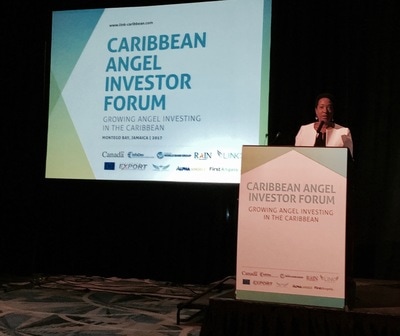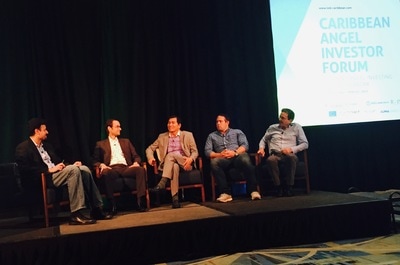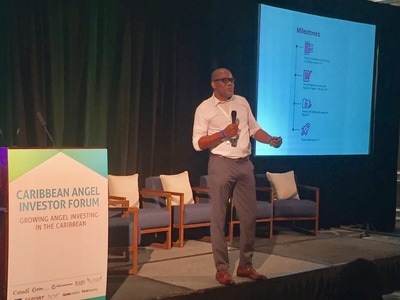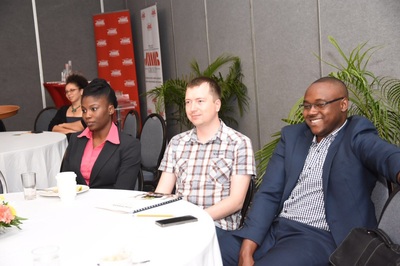|
The region’s first angel investment conference aligns entrepreneurs and funders for a diversified regional economy
Last week I attended and presented at the Caribbean Angel Investor Forum in Montego Bay, Jamaica, the first conference of its kind. Jointly organized by the Caribbean Export Development Agency and the World Bank. The goal was to put angel investing in the Caribbean on the map and seek to professionalize the emergence of a new asset class which can be a key driver for economic growth and job creation. It was hoped that it could also deal with debunking the stereotype of angel investing as some sort of game for the wealthy only. Not only do many people invest at the angel level these days, they do this in combination with offering mentoring start-ups and helping to build ecosystems that will support stronger and above all more diversified economies. A number of angel investors, lawyers, entrepreneurs and government officials from all over the Caribbean as well as the US and Canada exchanged ideas and above all sought to learn from each other. The Caribbean has not been immune to global shifts and the Trinidad delegation pointed out that their economy could no longer take oil revenues for granted and that diversification of the economy through angel deals was a necessity for them. While each country had its own issues, it was key to bring them on all on the same page with regards to proper angel investing. It was therefore good that at the opening Tomi Davies from Nigeria laid down very clearly that early stage investing was primarily investing in people and building long-term relationships. It was relatively easy for me to expand on that theme by explaining that I had seen well-funded companies with great technologies fail, while I had seen relatively lower-tech companies with limited amounts of cash flourish simply because of the people involved. While in some Caribbean countries the concept of angel investing has only just taken hold, others are making solid progress and have raised the bar significantly. In the latter category falls First Angels Jamaica, which has built up a small portfolio of interesting investments but above all has developed a very disciplined investment approach. At the same time they are lobbying for government and regulatory support, which will benefit all Jamaican investors and entrepreneurs. Its chairman, Joseph Matalon, opened and closed the conference and not only shared his experiences to date but pointed to the challenges in getting government support. In that he elaborated on the fact that politicians are driven by election cycles and that building ecosystems where angels invest and nurture emerging companies takes much longer. This is something we have seen in Canada as well where the focus on natural resource projects somehow always outranks entrepreneurial activity during election cycles. In any case, Jamaica’s minister of state for finance, Fayval Williams, was present to hear this message and took the opportunity to summarize the progress the island state has made and emphasizing the fertile ground it now is for entrepreneurial activity. It was timely that the NACO common documents had just been launched so I could give some depth and materials to my workshops on deal structuring and due diligence and share some vital education with the Caribbean community. There was energy and a clear thirst for knowledge on how to negotiate financings, how to create solid working relationships with entrepreneurs, and equally important, how to get angel investors to work together: share deals, pool funds and do due diligence together in an organized way. The best part of the conference for me were the entrepreneur sessions. A number of regional start-ups pitched their ideas followed by ‘speed-dating’ at a number of tables. The impressive thing was not only the quality of the pitches – they would easily be very competitive in a North American setting – but the visionary and global approach each entrepreneur took. They all understood that their market was pan-Caribbean and global and their plans and ambitions more than underlined that. A much needed emergency platform, an extremely energetic candy manufacturer, a Caribbean Uber-type transportation play, an in-ABM advertising deal that generated some interesting revenue streams and a platform for stroke and elderly patients brought the audience to action. It was great to have dinner afterwards with a few of them, one local entrepreneur had graduated from MIT, set up his mobile survey conversations start-up in Kenya and had now stopped at the conference on his way to Silicon Valley to talk about his Series A financing. Global thinking in action indeed. So there is no lack of ambition and willingness to finance and nurture an emerging angel and start-up ecosystem in the Caribbean and kudos to those that have taken the plunge in making it happen. But there are some major hurdles too. Lack of capital is not one of them according to most of the participants although some time was spent on figuring out how to mobilize the Caribbean diaspora to invest back home, much like ethnic Chinese have done when their country roared back to growth in recent decades. Lack of investable deals however was the key and most cited issue. Building deal flow not only requires patience, it also is a matter of education, mentoring and changing a mindset as is engaging with local universities and possibly enticing diaspora talent to come back and start companies. Add to that the common complaint that local entrepreneurs often lack the maturity to negotiate a deal and be mentored and it became very clear where the energies are to be focused. A combination of education and trial and error will in the end yield results and this is exactly what Matalon alluded to when he spoke about the time and effort involved in building successful start-up ecosystems. The key driver for this however in the end is success. Not until the first early stage deals grow, become success stories and generate exits, will the larger environment take notice and mobilize new entrepreneurial minds who have seen that it can be done while also unearthing new pools of capital. While each participant came away with different insights and ideas, all of them were energized. At the same time they were armed with a good sense of reality by understanding in what areas work needs to be done going forward. The first Caribbean Angel Investor Forum was a well-organized effort and a good start to get that process going. Keep your eyes open for the next emerging start-up market.
3 Comments
Over the past year I have been conducting a workshop on structuring early stage deals and term sheets as part of the NACO Academy. Now this will take me to such places as Calgary and Kitchener to name a few, so imagine my pleasant surprise when I was invited to conduct the workshop in Kingston, Jamaica. The local angel investing group FirstAngels Jamaica had organized a two-day event where they would present one of their latest deals, have their members network and allow me to run two modules, one a general introduction to angel investing and a second one focused on term sheets. Like any other small nation Jamaica is forced, by history and circumstances, to look outward and be creative in developing its economic potential. And for good measure this goes well beyond reggae, tourism and having great athletes booking Olympic successes. Jamaica consequently is a nation of entrepreneurs and in that they are supported by a well-connected Jamaican diaspora that is able to source capital and deals that spur entrepreneurial activity on the island nation of some three million people. In addition it is also one of the key hubs for Caribbean economic development. So it was great to discuss the deals FirstAngels had recently done and understand how local universities on the island plugged into this development. What emerged was a country with a real zest to develop new business sectors, ideas ready to be funded and incubated by a steadily growing class of private investors keen to diversify their holdings and help fund local growth. When asked what the biggest constraint was on growing this community the answer was as I had expected: deal flow. So far FirstAngels has funded four deals and they are keen to find more within their geographic setting, it should be noted that angel investors generally prefer to invest close to home. During the actual workshops and panel discussion it was interesting to see the parallels and differences with other angel networks in North America. There were lots of questions from the audience that consisted of both (aspiring) investors, entrepreneurs and various professionals. A lot of time and questions dealt with valuation and I did my best to dissuade the attendees from getting too hung up over these and encouraged them to focus on the bigger picture and map out the future financing milestones of a new venture first. It was also rewarding to dive deeper into concepts that weren’t fully incorporated into local deal structuring and I happily elaborated on founder vesting and structuring option plans. It was great to have some Jamaican lawyers on the panel and get them to share some of their experiences. But above all it was great to meet the entrepreneurs and learn how they got their businesses off the ground with limited resources. FirstAngels presented their most recent deal, an investment in BookFusion, and the e-book company is not any different from US or Canadian startups. Having cleverly outsourced some development to Europe combined with a US presence this Jamaican company is on to the next step with the support of the local angel community. Their story merged perfectly into my framework for the workshop and enabled all the participants to learn more about starting and financing companies and above all feel energized to take the next steps in that process. As for me I really enjoyed the extremely friendly and positive Jamaican atmosphere and once more realized how the rapid movement of capital and ideas is fuelling a new breed of economic activity across borders. Note: anyone interested in getting me to do the two-hour introduction to angel investing or the four-hour structuring deals and term sheet workshops should contact Melissa Dodaro at NACO for further details. The Inevitable Evolution of Angel Investing
Digesting the news, I very often cannot but help think that angel investing is the next bubble that is unfolding in front of us. Having lived through the stock market and dot.com boom of the 90s, the real estate boom and the commodities boom that started to peter out over the last few years (remember gold at $2000?), the question has indeed been, what is next? Emerging as a fairly specialist area for accomplished entrepreneurs with the means to support new tech companies, angel investing has now gone mainstream. The evidence for this phenomenon is all around us, witness the many groups, forums and now an online Angellist as the go-to place to source new deals and find angel investors. Judging from the participation at various events, the angel investor of today no longer meets the specifications of the original thing. No, the ranks of Silicon Valley millionaires are now joined by lawyers, doctors, unemployed corporate executives, professors and housewives tapping into their home equity lines. At a recent forum one of the organizers claimed she had ‘borrowed money from her dad’ to invest in a not to be missed deal. All of this is further fueled by TV shows like The Dragon’s Den or celebrity angels like Justin Bieber and the NYT telling us that in Silicon Valley the dollars keep growing on trees for new deals, good and bad. The deeper reasons behind this phenomenon are threefold I think. As mentioned earlier the fact that money is still cheap and other booms have run out of steam, it is only a natural reaction to seek out a new asset class that is somewhat isolated from the vagaries of public markets while promising potential upsides that are no longer to be had in more conventional markets. Or at least, that appears to be the common train of thought among angel investors who are more than willing to trade high risk for the prospect of healthy and possibly outsized returns. Equally important is how both the financial crisis and the rapid globalization of our economies have brutalized the corporate rank and file. No more guaranteed careers with gold plated pension plans, no, journeys on the corporate ladder are now very short experiences and an early exit package enables many a former exec to buy into the early stage angel game and in the process develop a new career, I know all about it. Finally, the relative ease with which it in now possible to pump out mobile apps and online platforms makes the barrier to begin a start-up lower, not just for young tech savvy kids, also the more seasoned former bus dev guy from IBM can now without too much effort call himself a ‘founder’. It is revealing to note that even in my own “middle-class suburban million dollar home average age fifty” community many a resident now professes to always have been an ‘entrepreneur at heart’. Of course, the well-paid corporate career was just a minor interruption in that journey of self discovery. And yes, he’s raising a little bridge, interested? The sheer glut of start-ups that has resulted from all of these concurrent developments have forever changed angel investing in a way that most of its participants have not yet fully grasped, at least that is the feeling I get when I hear where some cheques are being written into. The high-risk nature of the early stage game has always necessitated above average returns in order to compensate for the many failed investments that litter any angel portfolio. Do not press me for a rate, but chances are that out of a portfolio of 10 angel-financed deals only one will go to a successful exit, if that. In general you can write off the majority of your angel portfolio to zero and pray that one or two will give you the kick-ass return that not only compensate for the loss but give you some level of upside over the years the funds were trapped in angel land. As it happens nowadays, I do fall asleep at angel gatherings or pitch evenings or beer demos or whatever they are called. It is not that they lack enthusiasm or energy, it is that there are not that many compelling propositions that actually solve a problem or really address a market need. The bulk of deals presented to angels are just not worthy of investment dollars, but that does not stop them from finding newly minted angels that are all too willing to do just that what they should absolutely not do. I will not throw around some lame jokes about ‘market engagement platforms that generate big data’ or ‘ethical reward coupon apps’, but you get the drift. So what that means is that an ever lowering barrier to build companies and an ever increasing number of angels funding new deals that hopped over this low barrier must further reduce the odds of winning. In other words, more but less sophisticated money is chasing ever more deals that are increasingly average. Read that last sentence again and you know what I mean: there will be tears down the road. Angels however have become smarter - the ones that lost earlier and have the stomach for another kick at the can - and have started to hunt in packs. One of the lessons learned was that most end up with a minority stake in deals that would have had a chance of survival had the angel investors combined had some sort of majority stake or level of control. My two angel funds have taken an approach that seeks to address this, but at the same time both funds have only managed to make one investment each this year, a time when there is both a glut of money and deals. Ergo, the money remains in the bank. So, does this mean that angel investing as originally conceived – the 100x for a groundbreaking piece of technology – has run its course? It is hard to say with certainty but my findings do point to an increase in smaller deals that are less exciting, less global in scope and potentially able to go from start to exit with far less capital than was previously the case. Angel investors therefore are now having to adjust to become smarter and invest in smaller deals that have a good chance of success, but where the eventual return may come in the form of modest dividends or an exit at the $10 to 20 million level rather than the $100 million meal ticket. Is this an attractive scenario for investors? I do think so, but it requires an adjustment in expectations, smarter investment strategies and a more hands on approach as investor. There is an angel bubble, definitely, but it won’t pop. It is just changing in size and form as we go along, all it requires is that we become smarter and pay more attention to how we deploy our efforts and funds. |
Archives
April 2020
Categories
All
|







 RSS Feed
RSS Feed